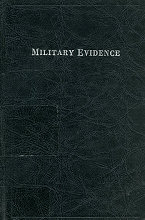
MUNSTER – LARKIN : Military evidence (előszó)
Traditionally the people of the United States have been opposed to large standing armies and navies. The movement toward immediate demobilization at the end of World War I and again at the cessation of actual hostilities during World War II exemplifies this tradition. But tradition has had to yield to stark reality. Our people and our Government looked at the domestic and world scenes and saw that our ideals and our ways of life were in great danger from enemies of democracy. To preserve our liberties we sacrificed tradition. Today we have millions of persons in uniform and millions of others working closely with those in uniform.
Congress foresaw the problems of a large military establishment. Among other things, it realized that the rules and regulations governing its conduct needed revision to meet changed conditions. Under its Constitutional authority to make the rules and regulations for the armed forces, it enacted the Uniform Code of Military Justice. The Code provides the framework for what has been aptly described as a third system of American criminal law, the other two being federal and state. As I pointed out in an opinion the "Federal practice applies to courts-martial procedures if not incompatible with military law or with the special requirements of the military establishment," but there are substantial and numerous differences. Those concerned with the administration of military justice have a double burden; not only must they know the general rules that obtain in federal civil law but they must also be aware of and apply the qualifications and special provisions of military law. It is not an easy task. Consequently, a critical analysis of the similarities and differences between the two systems of law is a welcome addition to the growing bibliography on military law. The welcome is especially warm when, as here, the analysis covers an area so important as that of Evidence.
The authors, Captain Munster and Captain Larkin have ranged wide through the complexities of the rules of Evidence, but they have established a useful and understandable pattern of approach. This is a book that proves itself by use.
ROBERT E. QUINN
Chief Judge
U. S. Court of Military Appeals
Washington, D. C.
1959